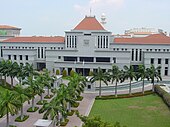Personal Data Protection Act 2012

| Personal Data Protection Act 2012 | |
|---|---|
 | |
| Parliament of Singapore | |
| |
| Citation | No. 26 of 2012 |
| Passed by | Parliament of Singapore |
| Passed | 15 October 2012 |
| Assented to | 20 November 2012 |
| Legislative history | |
| Bill title | Personal Data Protection Bill |
| Introduced by | Assoc Prof Dr Yaacob Ibrahim |
| Status: In force | |
The Personal Data Protection Act 2012 ("PDPA") sets out the law on data protection in Singapore. The PDPA regulates the processing of personal data in the private sector.[1]
Overview
[edit]The PDPA establishes a general data protection regime, originally comprising nine data protection obligations which are imposed on organisations: the Consent Obligation, the Purpose Limitation Obligation, the Notification Obligation, the Access and Correction Obligation, the Accuracy Obligation, the Protection Obligation, the Retention Limitation Obligation, the Transfer Limitation Obligation and the Openness Obligation (now referred to as the Accountability Obligation).[2]
Major amendments to the PDPA were proposed and passed in 2020.[3][4] Among other changes, a tenth data protection obligation was added, namely, the Data Breach Notification Obligation.[5]
The PDPA also governs telemarketing in Singapore. It establishes the Do Not Call Registers, on which telephone numbers may be registered. There are three Do Not Call Registers: (i) the No Fax Message Register; (ii) the No Text Message Register; and (iii) the No Voice Call Register. Generally, if a telephone number is listed on a Do Not Call Register (e.g. the No Text Message Register), then it is not permitted to send a marketing message of the relevant kind to that telephone number.[6]
Personal Data Protection Commission
[edit]The PDPA establishes the Personal Data Protection Commission ("PDPC") as the regulatory authority governing data protection in Singapore. The PDPC enforces the PDPA and publishes advisory guidelines on the interpretation of the PDPA.[7] To date, the PDPC has enforced the PDPA against a number of organisations.[8][9][10] Notable cases include SingHealth, which was implicated in the 2018 SingHealth data breach.[11]
References
[edit]- ^ "Parliament: Public agencies not governed by PDPA because of fundamental differences in how they operate". The Straits Times.
- ^ Wong, Benjamin (2017). "Data privacy law in Singapore: the Personal Data Protection Act 2012". International Data Privacy Law. 7 (4): 287–302. doi:10.1093/idpl/ipx016.
- ^ "On protecting data while enabling innovation: 6 highlights from MPs' rigorous debate on PDPA amendments". The Straits Times.
- ^ "Parliament: Proposed changes to PDPA include stiffer fines for data breaches, mandatory notification when they occur". The Straits Times.
- ^ Personal Data Protection (Amendment) Act 2020. Singapore. 2 November 2020.
- ^ "Do Not Call Registry: An easy guide for consumers". The Straits Times.
- ^ "About Us". Personal Data Protection Commission. Retrieved 6 April 2021.
- ^ "CDP and two other organisations fined for data privacy breach". The Straits Times.
- ^ "Courts fined $9,000 for second data breach in two years". The Straits Times.
- ^ "Grab fined $10k over fourth data privacy breach in two years". The Straits Times.
- ^ "Singapore health system hit by 'most serious breach of personal data' in cyberattack; PM Lee's data targeted". CNA.
